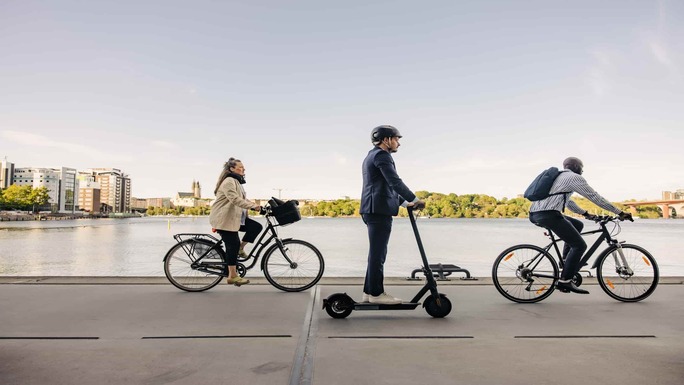With environmental concerns becoming more important by the day, it’s no wonder the hotel industry is moving towards more sustainable ways of doing business. Hotels, resorts and other hospitality venues are starting to put more emphasis on recycling, eco-friendly design, sustainable materials and ways they can coexist more harmoniously with local people and the environment.
Whether you want to open your own hotel or help guide the future of hospitality towards greater sustainability, there are many opportunities. In this article, we’ll go over the main ways hotels are improving their eco-friendly credentials.
Introduction to sustainable hotels
Just like every other major industry, hospitality can help build a more sustainable world by contributing to environmental preservation, social progress and economic resilience. Using practices that emphasize environmental preservation, sustainable hotels allow travelers and guests to lower their carbon footprint while savoring luxury vacations.
Employing green building techniques, water conservation measures and responsible food waste disposal schemes and focusing on energy efficiency goals, these properties truly embody the mantra of ‘planet friendly travel’. But it doesn’t stop there. Their food and beverage selections can highlight locally sourced ingredients and low-impact production methods and their social responsibility practices can help support local communities.
The essence of an eco resort lies in sustainability becoming an ally to mother nature, setting new standards for tomorrow’s holiday destinations. This means that working in sustainable hotels can be a great way of helping protect the environment while still focusing on an exciting career in hospitality and giving guests the best experience possible.
Take a leading role in shaping sustainable hospitality with our master’s that combines cutting-edge insights from ground-breaking professionals with opportunities for networking and mentorship.

Types of sustainable hotels
With sustainability becoming a bigger part of the travel industry, we are seeing the emergence of various types of sustainable hotels. Let’s explore a few important categories, including green hotels, eco-resorts and luxury options.
1. Green hotels
These establishments place a high priority on environmentally friendly practices throughout their entire business model. These hotels employ a wide range of green policies to help lower the negative impact on the environment, including green cleaning methods, conserving water and sourcing food locally. The overall approach of green hotels means that guests can be assured their stay is having a minimal negative impact on the local environment.
2. Eco luxury resorts
Luxury and sustainability may not always go hand in hand, but there are establishments that have managed to strike the perfect balance. These eco luxury resorts prioritize both opulence and planet-friendly travel, offering guests lavish accommodations while keeping their carbon footprint remarkably low.
3. Natural hotels
Natural hotels offer travelers an authentic experience, often situated in stunning, meticulously preserved landscapes. These hotels prioritize using local materials for construction, ensuring they harmoniously blend with their natural surroundings. Such properties are particularly common in national parks or nature reserves.
4. Camping-style hotels and resorts
With so many buildings already crowding natural landscapes, there is increased demand for temporary camping-style hotels, which have less impact and can be removed easily when no longer needed. These are often used for safari adventures, rainforest treks or nature-based retreats. However, being ‘camping-style’ doesn’t mean they are not luxurious as guests still enjoy plenty of luxury amenities.
Green building practices used in sustainable hotels
To achieve true sustainability in hotels, it’s essential for green principles to go beyond superficial actions. This type of accommodation embraces eco-friendly philosophy, guided by green building practices. Such practices include:
- Local and recycled materials: sustainable hotels prioritize local materials, reducing carbon emissions from transportation. They also make use of recycled and reclaimed materials or local natural materials as an essential part of design and construction
- Innovative design: green hotels are characterized by innovative design, for example, using natural sunlight to the fullest extent to minimize energy consumption
- Energy efficiency: green buildings incorporate energy-efficient HVAC (heating, ventilation and air conditioning) systems with insulated walls
- Integration with the landscape: eco resorts are designed to seamlessly blend with local ecosystems. This includes incorporating features such as rooftop gardens and rainwater collection to reduce the need for water infrastructure
- Renewable energy: the wind and solar power used by sustainable hotels are environmentally friendly sources of energy that reduce carbon emissions while still providing necessary modern comforts
- Water conservation: by using low-flow fixtures and implementing greywater recycling systems, water can be conserved both during the construction phase and while guests are at the property
Energy efficiency in sustainable hotels
Energy efficiency is one of the top priorities for sustainable hotels. Eco-friendly establishments target efficient energy usage, aiming for carbon neutral processes in their commitment to environmentally-conscious travel. Among the energy efficiency initiatives they launch include:
- Heating and cooling developments: innovation in hotels such as geothermal systems and passive solar designs minimize energy use, contributing to more sustainable operations
- Renewable energy integration: solar panels and wind turbines reduce reliance on traditional power sources, embracing clean energy alternatives
- Smart technology implementation: eco-friendly lodgings use automatic lights-out systems and occupancy sensors to optimize electricity usage
- Green appliances: high-efficiency HVAC units, LED lighting and low-flow toilets curb resource consumption without compromising comfort
- Guest awareness: educating guests about simple energy saving practices, such as turning off lights, encourages individual contributions to overall sustainability
Water conservation in sustainable hotels
Water, a critical resource in environmental conservation, is at the forefront of sustainable hotels’ efforts. They’re adopting green water use practices that go beyond surface-level eco-consciousness, including:
- Intelligent design: modern eco-resorts integrate rainwater harvesting systems into their blueprint, using collected rainwater for non-potable uses
- Efficiency in fixtures: eco-friendly hotels install low-flow fixtures in bathrooms, reducing water flow without sacrificing convenience, and boost savings with water-efficient washing machines
- Guest involvement: hotels promote towel and linen reuse, encouraging guest participation in water conservation and reducing energy and detergent use
- Greywater recycling: some hotels recycle greywater — lightly used water from sinks, showers and dishwashers — purifying it for indoor reuse such as in toilets or for outdoor purposes such as gardening
- Native landscaping: sustainable hotels use native plants for landscaping, enhancing aesthetics while reducing water needs compared to more exotic varieties
Sustainable hotels are actively shaping the future of water conservation while offering guests an eco-conscious yet comfortable experience.
Waste management in sustainable hotels
Waste management plays a pivotal role in sustainable hotels’ operations, reflecting their commitment to minimizing environmental impact. Robust waste management is a cornerstone of hotel sustainability and includes:
- Recycling: sustainable hotels provide bins for paper, glass, plastic and metal, engaging staff and guests. Some go further with organic waste composting and local recycling partnerships
- Reduced packaging: green hotels prioritize bulk purchases to reduce single-use plastic waste and purchase items with recyclable packaging
- Material repurposing: used items find new life; old curtains become laundry bags, while worn linens turn into cleaning rags
- Electronic waste: proper disposal of electronics that contain harmful components is a priority
Sustainable food and beverage practices in hotels
A notable characteristic of a sustainable hotel is its commitment to green food and beverage practices. Such hotels realize the environmental impact of food production, packaging, transportation and waste, so align with initiatives that reduce these effects. Among the practices they observe are:
- sourcing local ingredients and implementing waste reduction strategies. This farm-to-table approach reduces the food’s carbon footprint and supports local economies
- offering organic menus that feature ingredients sourced from on-site gardens, meaning guests can enjoy fine dining while supporting sustainable practices
- composting and donating excess food to food banks or charities. Additionally, eco-friendly beverage choices can include serving drinking water upon request and using refillable containers instead of single-use plastic bottles
- offering shade-grown coffee options that help combat deforestation
Sustainable transportation practices in hotels

Maskot/DigitalVision via Getty Images
Eco-conscious travel companies prioritize sustainable transportation as a key aspect of operations to reduce carbon footprints. They frequently collaborate with local hybrid or electric transport services to offer energy-efficient options for guests that promote eco-friendly travel. Initiatives include:
- hotel shuttle services have made environmentally friendly changes by switching to electric or hybrid vehicles for airport transfers and sightseeing. This helps reduce greenhouse gas emissions
- eco hotels promote non-motorized transport by offering bikes for rent and walking routes for low-impact sightseeing. This encourages a healthier living environment and allows guests to explore as they wish
- green-commuting is promoted by innovative natural hotels through the installation of EV charging stations that benefit employees and guests
- embracing partnerships with carpooling and ride-sharing platforms, managed through user-friendly apps, promotes intelligent and eco-friendly transportation options
Social responsibility practices in sustainable hotels
Social responsibility is a key facet of sustainable hotels. This demonstrates a hotel’s commitment to protecting the environment and supporting local communities with fair operational practices. Among the practices they employ are:
Creating job opportunities
Green hotels foster local employment, bolster economic growth and contribute to community wellbeing.
Local sourcing and fair trade
Local sourcing is all about sourcing materials, foods, consumables, and any other supplies from local businesses. This promotes fair trade practices and supports nearby farms and businesses, helping boost local employment.
Cultural respect
Having respect for the local cultures and areas where hotels operate is important. This means prioritizing cultural preservation and integrating the area’s heritage into the hospitality businesses in the area. This enhances guest experience with education, cultural understanding, and a chance to enjoy other cultures.
Community outreach programs
Responsible hotels show active involvement in community initiatives, for example driving education programs, cleanliness drives, and helping out with local charities. This demonstrates a commitment to social harmony and neighborhood welfare.
Certifications for sustainable hotels
Certifications for hotels come from recognized organizations committed to making planet-friendly travel more accessible and authentic, making sure that hotels are indeed providing the support they claim for the local environment. The auditors of these organizations are usually educated to degree level, with some even possibly possessing hospitality degrees. All of these individuals will be experts in sustainable hotel practices. They audit hotels against many criteria related to environmental impact, social responsibility, waste management and energy efficiency. Among the certifications are:
- Global Sustainable Tourism Council (GSTC), which provides guidelines for sustainability in several areas, including management and socio-economic policy that affects local communities
- Green Globe certification focuses on energy efficiency in accommodation, particularly luxury eco-resorts. Certified properties must have robust water conservation strategies and stringent waste reduction in place
- EarthCheck certification examines green building practices by performing science-based benchmarking assessments specific to natural hotels and eco-luxury resorts
- LEED (Leadership in Energy and Environmental Design) is an internationally accepted certification that sets superior standards of resource optimization and minimizing carbon emissions
Choosing to work at an accredited eco hotel can help boost your hospitality career and also support holistic growth for local communities. If you want to work in eco-tourism, looking for these certifications can give you an indication of how well a hotel is performing. However, you can always encourage other hotels you find yourself working in to embrace sustainability criteria as well.
Learn the fundamentals of green tourism with our bachelor’s in hospitality management, which will help you build a dynamic career that’s good for you and the planet.

Examples of sustainable hotels around the world
The following sustainable hotels, representing top hotel brands, have established their position through conscious environmental planning, advocating for planet-friendly travel and ensuring a luxury experience:
- Sherwood Queenstown, New Zealand: this captivating eco-resort takes pride in its renewable energy sources and is powered entirely by solar panels, ensuring a minimized carbon footprint
- Six Senses Con Dao, Vietnam: a mesmerizing luxury eco-resort that sits within a national and marine park. It has incredible views and incorporates sustainability practices, including a sea turtle protection program
- Sansok Ecolodge, Guatemala: located by Lake Atitlán, this natural hotel has embraced green architecture with open-air design that reduces the need for artificial lighting or cooling systems
- Whitepod Eco-Luxury Hotel, Switzerland: sustainability isn’t just for hot climates. Surrounded by snow-capped mountains, Whitepod offers unique geodesic dome accommodation that prioritizes minimizing ecological impact without sacrificing comfort or elegance
- The Brando, French Polynesia: named after its famous former owner Marlon Brando, this eco-luxury resort uses renewable energies such as solar power and coconut oil biofuel to operate delicately amid fragile ecosystems
- Proximity Hotel, United States: based in North Carolina, Proximity deploys more than 70 sustainable practices to proudly claim the title of America’s first certified LEED Platinum ‘green’ hotel.
What roles are there within sustainable hotels?
Here are some specific examples of sustainable hospitality roles and the skills they require:
- Sustainability manager: responsible for developing and implementing sustainability initiatives across an organization. These professionals will have a strong understanding of sustainability principles and practices as well as experience in project and change management
- Green event planner: responsible for planning and executing events that minimize environmental impact. Successful geen event planners have experience in event planning and logistics for different types of events, as well as knowledge of sustainability.
- Energy auditor: assesses the energy efficiency of buildings and equipment, is trained in energy auditing and is familiar with energy-saving technologies
- Waste manager: manages waste from hotels, restaurants and other hospitality businesses. This role requires knowledge of waste management practices and the ability to implement effective waste reduction and recycling programs
- Green building designer: designing buildings that are environmentally friendly and sustainable. A background in architecture or engineering and familiarity with new green building methods are needed.
Conclusion
Working in sustainable hotels is not just a job; it’s a commitment to a more responsible future for our planet and its inhabitants. The hospitality industry has recognized the urgent need for eco-conscious practices and sustainable hotels are at the forefront of this movement. If you’re interested in working in this area and helping hotel companies improve their green practices, you should start with an initial qualification in a hospitality discipline, then look at further specialist study. A bachelor’s in hotel management from Les Roches could provide the perfect foundations for a sustainable hotel career, so get started today.
Photo Credit
Main Image: Thomas Barwick/DigitalVision via Getty Images




